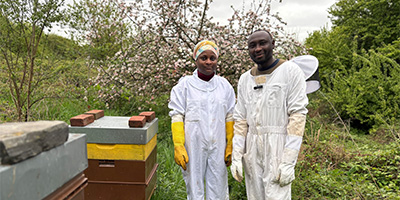Asian hornet traps: encouraging results in Houyet
Since 2023, the fight against the Asian hornet, a real scourge for domestic and wild bees, has been mobilising the beekeeping community.
As part of our support measures for the Hastière-Pondrôme project, we decided to finance the purchase of several dozen selective traps for beekeepers in the municipalities of Beauraing, Hastière and Houyet.
Almost a year later, the results of this initiative are encouraging!
Effective selective traps
According to Souleymane Moussa, a beekeeper in Houyet, the traps proved their worth last season.
"In just a few months, we captured more than 1,000 Asian hornets, over 300 of them thanks to the two traps placed near my hives", he says, adding that several of his bee colonies had been decimated by Asian hornets before the traps arrived. According to the beekeepers, the traps are highly effective and will help to reduce the spread of the species in the area.
The traps’ clever design enables them to capture these predators, while sparing both domestic and wild bees, as well as other species of flying insect that can enter and exit the trap, unlike hornets, which are too big to get out.
A threat to biodiversity
The Asian hornet is an invasive species that has been present in our regions since 2016, and is a serious threat in Belgium. Not only does it feed on bees and other native insects that are essential to our ecosystem, but it can also be aggressive towards humans, especially near nests.
Capturing queens and identifying nests
To counter this threat, beekeepers captured founding queens last spring (over 70 queens were caught in traps at Houyet) and destroyed primary nests. These nests are about the size of an orange and are often hidden less than three metres under roofs or in garages.
Specialists recommend that you never attempt to destroy a nest yourself; it needs to be done by professionals who are properly equipped for the task.
With the support of local authorities and the expertise of our partner, Ecofirst, we will continue to take action to preserve biodiversity and encourage the energy transition.


